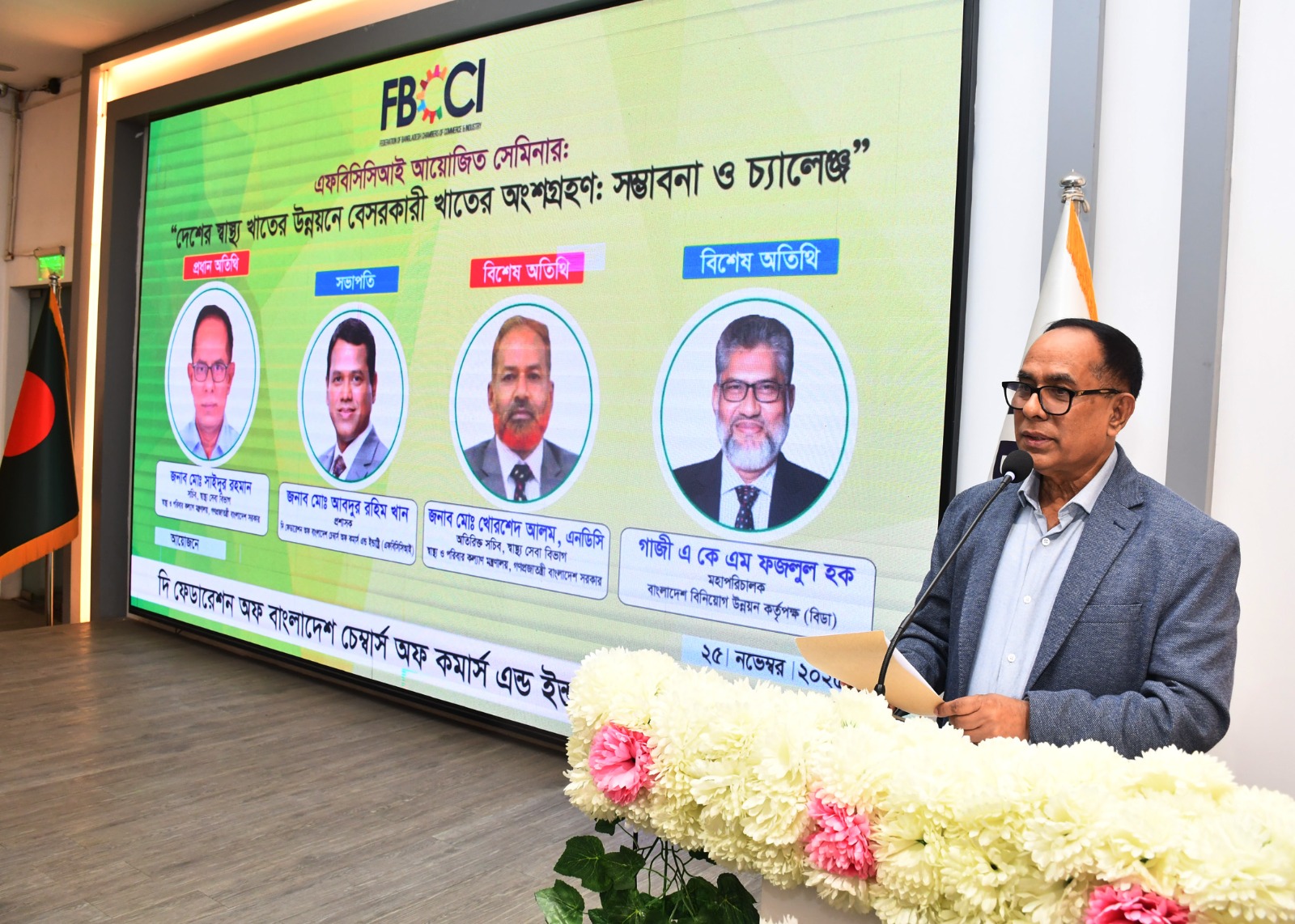News Flash

DHAKA, Nov 25, 2025 (BSS) - Entrepreneurs and analysts today strongly urged the government to implement contemporary policies for the sustainable development of Bangladesh’s healthcare, medical equipment, and pharmaceutical industries.
They advised simplifying the process for obtaining and renewing licenses for private hospitals, medical equipment, and pharmaceutical sectors.
These demands emerged during a seminar titled “Participation of the Private Sector in the Development of the Health Sector: Opportunities and Challenges,” organized by the Federation of Bangladesh Chambers of Commerce and Industry (FBCCI) at Motijheel in the city, said a press release.
Md. Saidur Rahman, Secretary of the Health Services Division of the Ministry of Health and Family Welfare, who attended the seminar as chief guest, confirmed that the government has already taken initiatives to further simplify the pharmaceutical industry's licensing process.
He mentioned that efforts are underway to grant licenses for a term of at least three years.
The Health Secretary also emphasized the need for local industry establishment of pharmaceutical raw materials, the reduction of import dependence, and enhanced research and development (R&D) to address challenges following LDC graduation.
He further stressed the government's rigorous monitoring to ensure compliance within the pharmaceutical industry and healthcare sector.
He highlighted the critical role of the private sector, stating that the government alone cannot ensure health services for all citizens.
He called for urgent coordination between the government, the private sector, and academia.
FBCCI Administrator Md. Abdur Rahim Khan, who chaired the seminar, delivered the welcome speech and stressed that ensuring quality healthcare must be coupled with continuous efforts to keep treatment costs affordable for patients.
Professor Dr Syed Abdul Hamid of the Institute of Health Economics at Dhaka University presented the keynote address, highlighting that lagging behind in the Active Pharmaceutical Ingredients (API) industry poses a major threat to the country’s pharmaceutical sector.
He also stated that complexities related to obtaining and renewing licenses for the medical equipment and pharmaceutical industries act as impediments to sectoral growth.
Major General (Retd.) Md. Mostafizur Rahman, CEO of the Bangladesh Association of Pharmaceutical Industry (BAPI), mentioned that an entrepreneur seeking to establish an API industry must collect licenses from 47 different organizations.
“This excessive procedure discourages investors, prompting him to call upon relevant authorities to introduce a One Stop Service (OSS) for simplifying the licensing process in this industry,” he added.
Md. Abdur Razzak, Managing Director of JMI Group emphasized that sustainable development in the medical equipment sector is impossible without the implementation of an updated policy.
He appealed to policymakers to focus on protecting local entrepreneurs and developing the industry’s ecosystem.
Md. Akramul Islam, Senior Director of the BRAC Health Program, stressed that if the licensing process is not simplified, the private sector will not be attracted to invest in healthcare, medical equipment, and pharmaceuticals.
Ghazi A K M Fazlul Haque, Director General of the Bangladesh Investment Development Authority (BIDA), announced that BIDA has taken steps to draft a separate policy framework specifically for the medical equipment industry.
This draft is expected to be implemented following evaluation, analysis, and consultation with the Directorate General of Drug Administration (DGDA), he added.
Md. Asraf Hossain, Director of the DGDA, addressed concerns about bureaucracy, stating that the DGDA is always striving to fulfill its responsibilities quickly and appropriately.
He clarified that while time is required for feasibility verification when an institution applies for a license, delays are not intentional.
FBCCI Secretary General Md. Alamgir noted that while the private sector has contributed significantly to the health sector since independence, the current government allocation remains negligible.
He called for increased budget allocation, along with an increase in the number of skilled doctors, nurses, and hospitals to improve the quality of healthcare.
The seminar was also attended by former directors of FBCCI, business leaders, and members of the general council.